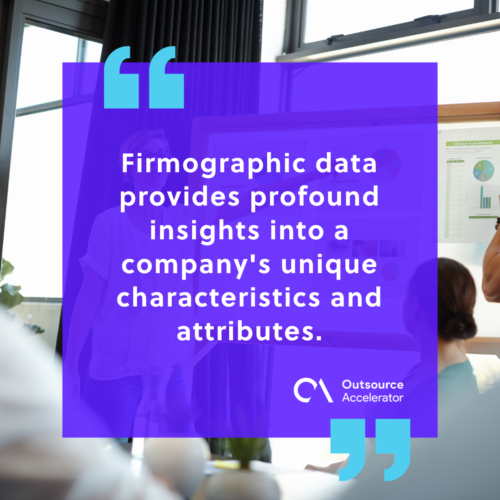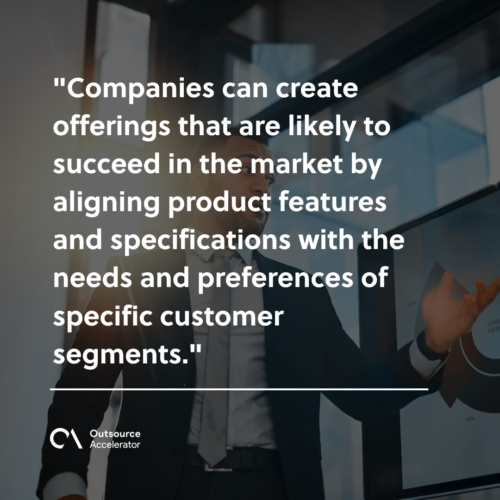Firmographic data: Definition, types, and benefits

Understanding your target audience is essential for a business to thrive because it forms the foundation for effective decision-making and strategy development.
You need to know to whom you should tailor your products, services, and marketing efforts to ensure your resources are effectively allocated.
To do this, you must collect pertinent firmographic data to help you gain invaluable insights into your potential customers’ characteristics, challenges, and expectations.
What is firmographic data?
Firmographic data is often regarded as the business world’s counterpart to demographic data. It serves as a crucial element in organizational data-driven decision-making.
Firmographic data provides profound insights into a company’s unique characteristics and attributes.
Just as demographic data unveils the intricacies of individuals, firmographic data delves deep into the corporate landscape, unraveling the distinctive traits that define businesses.
The significance of firmographic data lies in its potential to empower business insights, paving the way for informed decisions.
By dissecting a company’s profile through the lens of firmographic data, organizations can make well-informed choices about the following aspects:
- Which markets to target
- Which goods or services to offer
- How to tailor their marketing strategies
Moreover, it assists in the optimization of overall operations, enabling companies to allocate resources more efficiently and refine product development efforts.

Significant types of firmographic data
Unlike demographic data, which revolves around personal details such as age, gender, and location, firmographic data focuses on critical elements in the B2B arena.
Collectively, these data points weave a comprehensive array of information that businesses can leverage to elevate their marketing strategies and decision-making processes.
Let’s explore each firmographic data type:
Company size
Determining the size of a company is crucial for market segmentation and targeting. Firms can be classified as small, medium, or large based on factors such as the number of employees, revenue, or assets.
Understanding a company’s size helps businesses tailor their products and services accordingly.
Industry
Each industry, whether healthcare, technology, finance, manufacturing, or any other sector, boasts its unique ecosystem, regulations, and market dynamics.
Recognizing the specific industry in which a company functions is vital because it serves as a compass guiding businesses toward crafting tailored marketing campaigns.
Location
Geographical location is a fundamental aspect of firmographic data. It provides insights into the regional preferences and requirements of businesses. It aids in targeted marketing and distribution strategies.
Ownership type
Knowing the ownership type in firmographic data collection provides valuable insight into a company’s corporate structure and financial stability.
It is a distinguishing factor in categorizing businesses into different ownership models, including:
- Private ownership
- Public trading status
- Subsidiary relationships with larger entities
Understanding these ownership distinctions is paramount in business as it sheds light on the company’s underlying organizational framework and its position within the market.

Company age
The age of a company, or its establishment date, reveals its experience level and market presence. Older firms may have a more extensive customer base, while newer ones might be more agile and open to innovation.
Collecting this firmographic data can be particularly advantageous when weathering economic downturns and maintaining long-term customer relationships.
How to collect firmographic data
Collecting firmographic data is a meticulous process that requires a combination of research methods and data sources.
There are several methods and sources for collecting firmographic data:
- Market research – Conducting surveys, interviews, and market research studies can provide firsthand insights into a company’s characteristics.
- Data providers – Providers aggregate and maintain vast repositories of firmographic data, making it accessible to businesses seeking comprehensive information.
- Public records – Publicly available records, such as business registries, financial reports, and government databases, can be valuable sources of firmographic data.
- Website scrapping – Extracting data from company websites, social media profiles, and online directories effectively collects firmographic information. Web scraping tools automate this process, making it scalable.
- Customer data – If you’re a B2B company, your existing customer base can be a rich source of firmographic data. You can collect this data through customer registration forms, surveys, or interactions with your sales and customer support teams.
- Partnerships and alliances – Collaborations and partnerships with other businesses can provide access to their firmographic data, enhancing your knowledge of shared or complementary markets.
Combining these methods tailored to your business goals can ensure a robust and up-to-date collection of firmographic data.
Benefits of firmographic data collection
Let’s explore the significant benefits of firmographic data for businesses:
Improved sales strategies
Firmographic data equips sales teams with the insights they need to craft tailored pitches and strategies.
Understanding a prospect’s industry, size, and location allows sales professionals to address their pain points and position products or services as the ideal solution.
This personalized approach can significantly boost sales effectiveness.
Enhanced product development
When businesses deeply understand their target audience’s firmographic characteristics, they can fine-tune their product development efforts.
Companies can create offerings that are likely to succeed in the market by aligning product features and specifications with the needs and preferences of specific customer segments.

Competitive analysis
Firmographic data is not just about understanding your own customers but also about gaining insights into your competitors.
Analyzing the firmographic profiles of competing businesses can reveal market gaps, untapped customer segments, and areas where your company can gain a competitive advantage.
Resource allocation
By leveraging firmographic data, companies can allocate resources such as sales and marketing budgets, personnel, and inventory more effectively. This ensures that resources are directed toward the most promising market segments.
Firmographic data is essential for market segmentation
Overall, understanding the firmographic makeup of your market can give you a competitive edge.
Firmographic data enables you to identify underserved or overlooked segments your competitors may have missed and help your business carve out a unique position in the market.







 Independent
Independent




